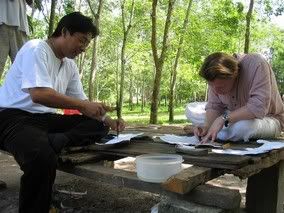 News of a very interesting event at CHAI House :
News of a very interesting event at CHAI House :MIGRATION SEASON at CHAI April - June 2010.Date : Thursday, 01 April 2010
MIGRATION SEASON at CHAI begins with poet and journalist Eddin Khoo's exploration of his family album.
~BLOOD LINES: Poetry, Memory and the family album~
"What began it all was the bright bone of a dream I could hardly hold onto..."
(Michael Ondaatje)
What is the nature of a family memory? How is that nature evoked in the encounter with a photograph? What do family histories conceal and how are family myths constructed? How is literature crafted from an unravelling of these?
For a decade, the writer has been collating photographs that piece together the family memory for a series of prose and prose poem remembrances.
In BLOOD LINES: Poetry, Memory and the Family Album he shares examples of photographs from his family album, explains the methods of use, reads excerpts from his assemblage of prose and prose poems and discusses the curious nature of memory and autobiography.
Eddin Khoo is a poet, writer, translator and journalist. Founder-Director of the cultural organisation Pusaka, he most recently collaborated with the late, critically acclaimed artist Ibrahim Hussein to complete the artist's autobiography, entitled IB: A Life ~ The Autobiography of Ibrahim Hussein.
Entry: Donation to CHAI Min RM10
Free Entry to CHAI- Wallahs*
* To find out more about how to become a CHAI-Wallah please e-mail us at chai@instantcafetheatre.com
Time: 20:30 - 22:30
Location: Instant CAFE's HOUSE of ART and IDEAS [CHAI]
Street: No. 6, Jalan 6/3, Off Jalan Templer, Section 6
Town/City: Petaling Jaya, Malaysia
Sad I won't be able to be there myself as I'm teaching ...

